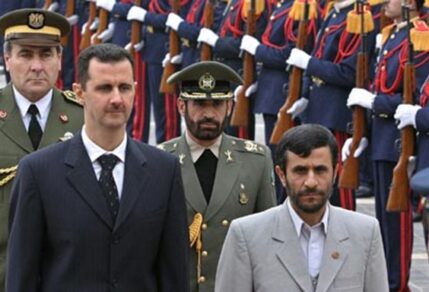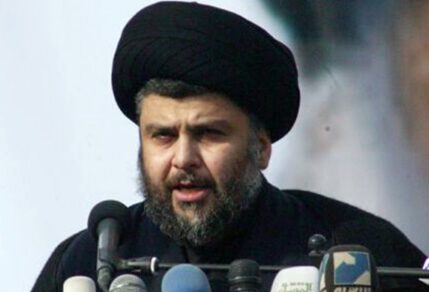Filter by date
Date
2026
2025
2024
2023
2022
2021
2020
2019
2018
2017
2016
2015
2014
2013
2012
2011
2010
2009
2008
2007
2006
2005
2004
2003
2002
2001
2000
1999
1998
1997
1996
1995
1970
Type
Report
Book
Event
Brief
Media Appearance
Publication
Publication
Vlad's Corner
Willy’s Corner
In a Fortnight
Spotlight on Terror
Fortnight in Review
Monitor
Prism
Russia and Eurasia Review
North Korea Review
Quarterly Special Report
China Brief
Eurasia Daily Monitor
Terrorism Monitor
China Brief Notes
Militant Leadership Monitor
Issue Briefs
Jamestown Perspectives
Terrorism Focus
Russia in the Middle East
Hot Issues
North Caucasus Weekly
Russia in Decline
Russia's Path to the High-Tech Battlespace
The Growing Importance of Belarus on NATO's Eastern Flank
War by Other Means
Topic
Topic
Domestic/Social
Economics
Elite
Foreign Policy
Military & Security
Terrorism
Economics & Energy
Cyber
Transit
Information Warfare
Espionage
Environment
Technology
Influence Operations
Space
BRI
propaganda
trade war
electronic warfare
radar countermeasures
EW RCM
railway
infrastructure
civil-military fusion
naval strategy
feminism
human rights
activism
cybersovereignty
Huawei
smart cities
united front
soccer
Islamophobia
Islam
censorship
renewable energy
china three gorges
Polisario
JCPOA
social credit
Politics & Society
Religion
Ideology / Propaganda
Culture
Diplomacy
Strategic Support Force
Mental Health
China Leadership
Extradition Bill
PLA Reforms
PLASSF
One Country Two Systems
social media
Surveillance
Maoist Thought
Information Technology and Telecommunications
Digital Silk Road
ICT and Telecommunications
China Pakistan Economic Corridor
Fourth Plenum
Trade
Motor Sich
Strategic Competition
Beidou
Marine Security Belt
Economic Diplomacy
Cross-Strait Relations
Taiwan Elections
Public Health
Hong Kong Protests
PLAN Marine Corps
U.S.-China Trade War
RMB Internationalization
Counterterrorism
Mil-to-Mil
COVID-19
Transportation
Indo-Pacific Strategy
Demographics
One Child Policy
Comprehensive Strategic Relationship
Ports
Legal Affairs
Uyghurs
Xi Jinping Thought
Political theory
PAP
Securitization
PLA Rocket Force
Military-Civil Fusion
Ethnic Minority Policy
Minority Ethnic Policy
Health Silk Road
Dual Circulation
US-China
Supply-Side Reform
Public Opinion
Population
DC/EP
national security
Food Security
Artificial Intelligence
CCP
Water
Law
Education
PLAAF
Counter-terrorism
Xinjiang
climate
democracy
Elite Politics
PLA
Corruption
Taiwan
Maritime Security
PLA Navy
LGBT
Faffff
Veteran
sports
crime
finance
Tibet
Organized Crime
agriculture
labor
Police
Global Governance
State Owned Enterprises
5G
Military Diplomacy
f
nuclear
ecology
PLAN
South Korea
Common Prosperity
Ideology
logistics
History
Public Security
tourism
Development
Hong Kong
Innovation
Research
Science
media
New Cold War
arms sales
Data
Defense Industry
Monetary Policy
Marxism
Nuclear Weapons
Aid
Flood
Hebei
regime stability
Natural disaster
mismanagement
KMT
DPP
Russia
Weapons
Ukraine War
Meloni
Italy
EU
Air Defense
Coastal Defense
Strategy
Myanmar
Burma
invasion
South China Sea
Vietnam
China-Vietnam
Hedging
US-Vietnam
gray zone
China-Russia
li keqiang
PBOC
currency
renminbi
economic espionage
semiconductors
Digital
Nicaragua
Latin America
Central America
Chokepoint
R&D
chips
State Council
Policy
Sino-German Relations
united nations
Self-revolution
CCDI
party building
National unification
India
Southeast Asia
Territorial Expansion
International Liaison Department
UFWD
biotechnology
special issue
XUAR
forced labor
Sunflower Movement
protest
TPP
TikTok
civil society
Kuma Academy
lawfare
constitution
Beijing
Urban Planning
industrial strategy
Two Sessions
New Combat Forces
New Quality Combat Forces
National Defense Mobilization
NPC
Private Military Company
Black Sea Fleet
MSS
Intelligence
coast guard
Territorial Integrity
TSMC
Sanctions
Central Foreign Affairs Work Conference
Gender
Women
Trafficking
ILO
International Institutions
Information Support Force
Mobilization
modernization
Comac
C919
Industrial policy
open-source
OpenHarmony
Article 23
Immigration
Xi Jinping
Putin
Uyghur
Peng Liyuan
multipolar
france
strategic autonomy
Germany
transnational repression
Crypto
legal
legislation
legislative yuan
reform
ICDT
conference
defense
dual-use
technology transfer
Seven Sons
south pacific
maritime
cryptocurrency
gray media
machine learning
machines translation
cognitive domain operations
CPAFFC
Subnational
Shangri-La Dialogue
cross-strait
Admiral Dong Jun
UNCLOS
International Law
maritime disputes
China Coast Guard
Unification
Reunification
book review
SCO
Shanghai Cooperation Organization
international order
UN
Technology competition
Photonics
Export Controls
Ant Group
Alibaba
Jack Ma
fintech
Third Plenum
Central Committee
Military Exercise
Joint Sword
Socialist States
security cooperation
Islamist
Antarctica
research security
discourse
ukraine
survey
Wind
solar
Lai Ching-te
SOE
fraud
turkiye
xinjijang
International Relations
GDI
GCI
GSI
Africa
Influence
privacy
business
Elections
Nuclear Energy
Joint Venture
Volkswagen
Taiwan Strait
FOCAC
MIIT
extraterritoriality
Military-military communication
Qin Gang
Foreign Minister
Fertilizer
security
OCAO
Overseas Chinese Affairs Office
stock market
stimulus
regulation
algorithms
Plenum
military-industrial
factions
AI
Election
Ministry of State Security
Ministry of Foreign Affairs
Nepal
Communism
Tibet-Aid Program
Stability
Economic Development
HSBC
repression
governance
smuggling
theft
foreign investment
real estate
vocational education
PRC
low-altitude economy
LLMs
AI Leadership
First Island Chain
drones
cognitive warfare
Undersea Cables
PLA Leadership
ADIZ
industry
science and technology
Deep Sea
Martime
sino-indian relations
One China Principle
State Media
DeepSeek
Europe
Academia
domestic
political
Brief
Militant Ideology
Impending Threats
Post-mortem
Profile
Extremism in Europe
Technological Innovation
Project
Project
Commentaries
Black Sea Battleground
CCP Stealth War Newsletter
Guardians of the Belt and Road
New Versus Old Cold War: Assessing the Current US-China Confrontation
Region
Region
Africa
The Caucasus
Central Asia
China and the Asia-Pacific
Europe
Latin America
Middle East
Russia
South Asia
North America
North Africa
East Africa
West Africa
Southern Africa
Georgia
Azerbaijan
North Caucasus
South Caucasus
Armenia
Kyrgyzstan
Turkmenistan
Uzbekistan
Kazakhstan
Tajikistan
Mongolia
Southeast Asia
China
Northeast Asia
Xinjiang
Taiwan
South China Sea
East China Sea
Japan
Hungary
Ukraine
Crimea
Belarus
Moldova
Baltics
Poland
Bulgaria
Macedonia
Balkans
Cyprus
Romania
Austria
Slovakia
Germany
Western Europe
France
Nordics
Central Europe
Colombia
Mexico
Venezuela
Caribbean
Cuba
Peru
El Salvador
Nicaragua
Costa Rica
Argentina
Brazil
Iran
Iraq
Syria
Yemen
Egypt
Lebanon
Jordan
Saudi Arabia
Oman
Far East/Siberia
Middle Volga
Arctic/High North
Afghanistan
Pakistan
India
Turkey
Canada
Nigeria
Bangladesh
Libya
Kenya
Senegal
Somalia
Central Africa
South Sudan
Kaliningrad/Baltic
North Korea
Myanmar
Indonesia
Niger
Europe's East
Lithuania
Latvia
Estonia
Serbia
Kosovo
Bosnia-Herzegovina
Croatia
Philippines
Mali
Algeria
Italy
Western China
Tibet
Morocco
Cameroon
Greece
Albania
Tunisia
Mauritania
Gambia
United Arab Emirates
Maldives
Qatar
Australia
Sudan
Chad
Israel
South Korea
Chile
Bahrain
Malaysia
Burkina Faso
Denmark
Greenland
United Kingdom
Singapore
Nepal
United States
Czech Republic
Sri Lanka
Mozambique
Central African Republic
Hong Kong
Vietnam
the Bahamas
Tanzania
Djibouti
Ivory Coast
Democratic Republic of the Congo
Uganda
South Africa
Sweden
Ethiopia
Eritrea
Panama
Montenegro
Bhutan
Ghana
Antarctic
Romania
Norway
Togo
Thailand
Finland
Pacific Island Countries
Solomon Islands
Fiji
Benin
Guatemala
Honduras
Belize
Paraguay
Malawi
Abkhazia
Arctic



